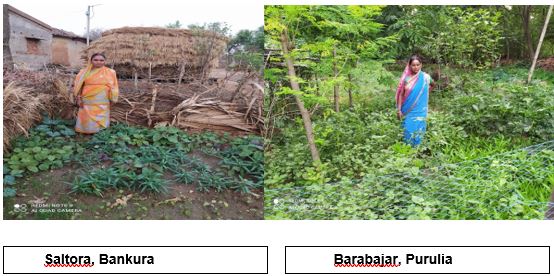Introduction
The sudden collapse of the market due to the pandemic made the unpredictability and instability of the market very evident. This led the organisation to take steps towards introducing the concept of alternative livelihood and market economy, amongst our members.

Due to the lockdown, the terrible downturn in the economy and the return of migrants, various families faced a substantial loss of income. At the same time, there was scarcity as well as a surge in the price of vegetables. We initiated our plan to help marginal farmers and rural families who own only small homesteads, focusing mainly on the women in such families. We worked with families that have very small plots of land, to start a kitchen garden - which can significantly improve the nutritional content of the families’ food. We have ensured that there are negligible expenses and zero requirements to go to the market for anything produced in the kitchen gardens. Training to make organic fertilisers and pesticides from natural sources, livestock and kitchen waste has also been provided.
We are also successful in involving a large number of youth in various activities, training and meetings of the organisation. Young men and women were given training to be trainers, thus giving them the confidence to lead a small group of people for the organic kitchen garden initiatives.
Activities
● Training to start organic kitchen gardens
56 young people (50% women) were
identified from 8 districts, who with the help of an external resource person
were trained to be trainers. This training helped them understand about organic
kitchen gardens and their benefits. They learnt how to cultivate and manage a
kitchen garden and are expected to further train beneficiaries as well as
follow up on their performance on a daily basis. The trainers have trained
15000 beneficiaries, as of June 2021. They have also been taught about seed
conservation.
The Organic kitchen garden project
focuses on building capacity, especially of women, to set up and nurture their
own supply of vegetables through the same. From reclaiming waste land to making
organic fertilisers and pesticides, everything has been taught to the trainers
in a series of training organised by the organisation.
Key effects or results
- People are developing an interest
towards the concept of kitchen gardens and realising its benefits.
- The beneficiaries have learnt to
make and use organic fertilizers and pesticides. They learnt to utilise waste
material (like vegetable peels, eggshells, used tea leaves etc.) which is
often discarded.
- With the production of vegetables,
enough to sustain one’s family, there has been a decrease in dependency on the
market for the same.
- People have been able to reclaim
wasteland for kitchen gardens.
- Some beneficiaries are working jointly on their organic
kitchen gardens, in a single plot of land. Extra produce is often distributed
amongst relatives and neighbours which has helped strengthen community
relations and has led to a further rise in interest in creating kitchen
gardens.
Challenges and our response
- It has been difficult to convince some people
to shift to organic production completely, due to lack of any prior experience
(in organic cultivation) of the cultivator. Some people have used both chemical
and organic fertilizers and pesticides, which has not generated the desired
results.
- The success of other kitchen gardens
in various areas we are working in helped us explain better how completely
organic kitchen gardens can produce sufficient yield. The disadvantages of
chemical fertilizers and pesticides were also restated.
- The production has suffered in various areas
where the salinity in water as well as soil is high, like areas of North and
South 24 Parganas.
- We have conducted discussions and
meetings putting forward the solutions to start and sustain kitchen gardens in
areas with high salinity of soil and water. People have been advised to
conserve rainwater, given saline resistant seeds and make kitchen gardens in
bags and tubs with soil that has low salinity.
- Shortage of water in districts like
Purulia and Bankura has made people apprehensive about starting these gardens.
- Techniques that help conserve water as well as
utilizing them for the gardens have been taught to all the beneficiaries.
Ancient irrigation methods like mulching, clay pot irrigation etc are being
taught and promoted.
What we learned and our Future Goals, strategies and
activities
● Over the course of the grant period
and working on kitchen gardens, we have realised the need to promote
requirement specific seeds and grains. Based on consumption patterns of the
people, we need to make sure that seeds (like paddy, wheat etc) can be procured
and distributed.
● We realize that livestock rearing is
another important aspect of being self sufficient and reduce dependence on the
market and would like to consider in the future.
● The Training of Trainers (ToT)
method, where a trainer is further expected to train 200-300 beneficiaries has
been successful for our organization. This was our first time attempting this
method and we intend to use it for some of our future projects too.
●
This particular project if extended for a longer period of
time can help spread the idea of organic kitchen gardens and, accept and shift
completely to an organic mode of production. Our intended seed conservation
would also take a longer time (i.e more than a year), thus we would like to
continue working on this project for a long term.
